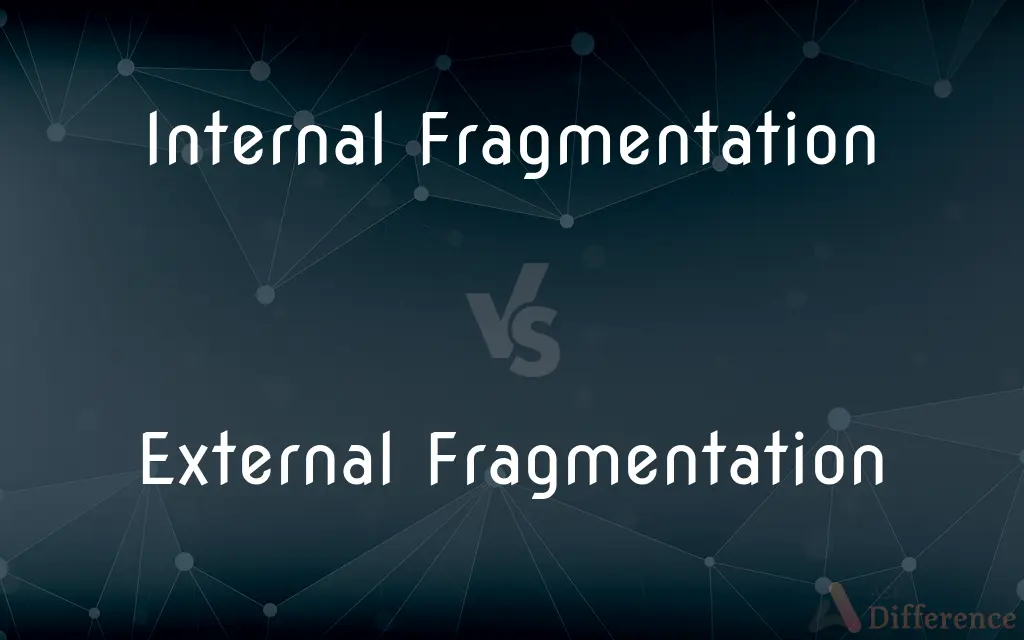Internal Fragmentation vs. External Fragmentation — What's the Difference?
By Tayyaba Rehman & Urooj Arif — Published on February 10, 2024
Internal fragmentation occurs when allocated memory has unused space within it, while external fragmentation happens when free memory is scattered in small blocks, making it unusable for larger allocations.

Difference Between Internal Fragmentation and External Fragmentation
Table of Contents
ADVERTISEMENT
Key Differences
Internal Fragmentation is a phenomenon in memory allocation where there is wasted space within an allocated memory block. This occurs typically in systems that allocate memory in fixed-sized blocks or partitions.
External Fragmentation, conversely, refers to the situation where free memory is fragmented into small, non-contiguous blocks. This happens over time as blocks of memory are allocated and freed, leaving small gaps between allocated blocks.
In Internal Fragmentation, the issue arises because the memory block allocated is larger than the requested memory. The leftover space within the block remains unused and thus, wasted.
External Fragmentation differs as it involves the overall memory space. Here, the total amount of free memory could be sufficient for a request, but it's not available in a single contiguous block, preventing allocation.
Internal Fragmentation is often considered less severe than external fragmentation as it does not prevent allocation of new blocks, but simply results in less efficient use of memory.
ADVERTISEMENT
External Fragmentation can lead to significant problems in memory allocation, especially in systems with long uptimes, as it can prevent large blocks from being allocated even when there is enough total free memory.
Comparison Chart
Cause
Allocated memory blocks being larger than necessary.
Small gaps between allocated memory blocks.
Location of Issue
Within allocated memory blocks.
In the overall memory space.
Effect on Allocation
Does not prevent allocation, but causes inefficiency.
Prevents allocation of large memory blocks.
Solution
Using variable-sized allocation or better size estimation.
Compaction, reordering, or using larger memory pools.
Typical Occurrence
In systems with fixed-size memory allocation.
In systems with dynamic allocation and frequent deallocation.
Compare with Definitions
Internal Fragmentation
Unused memory within an allocated block.
Internal fragmentation led to inefficient memory use in the program.
External Fragmentation
Small, non-contiguous free memory spaces.
External fragmentation made it impossible to allocate large memory blocks.
Internal Fragmentation
Unutilized segments within allocated memory.
Internal fragmentation was evident in the allocated memory blocks.
External Fragmentation
Prevents allocation of larger memory blocks.
The system's external fragmentation stopped larger allocations.
Internal Fragmentation
Inefficiency within individual memory blocks.
The application suffered from internal fragmentation due to oversized allocations.
External Fragmentation
Challenge in allocating continuous memory.
External fragmentation posed a challenge in efficient memory management.
Internal Fragmentation
Allocation of more memory than necessary.
The fixed block size caused internal fragmentation.
External Fragmentation
Occurs with continuous memory operations.
High external fragmentation was due to frequent memory deallocation.
Internal Fragmentation
Occurs in systems with fixed-size memory blocks.
Internal fragmentation is common in systems with fixed partition sizes.
External Fragmentation
Unusable scattered free memory.
External fragmentation was observed due to the scattered nature of free memory.
Common Curiosities
What is internal fragmentation?
Internal fragmentation is the wastage of memory within allocated blocks.
How does external fragmentation occur?
External fragmentation occurs due to scattered free memory spaces from frequent allocations and deallocations.
Can internal fragmentation be completely eliminated?
Not entirely, but it can be minimized with better allocation strategies.
Is external fragmentation a bigger issue than internal fragmentation?
Yes, as it can prevent allocation of needed memory blocks.
What causes internal fragmentation?
It's often caused by allocating memory blocks that are larger than required.
Does internal fragmentation affect system performance?
It can lead to inefficient memory use, but generally does not affect system performance significantly.
Can external fragmentation be solved with more memory?
More memory can mitigate it, but does not solve the underlying issue.
What impact does external fragmentation have on software?
It can lead to difficulties in memory allocation for applications, affecting their performance.
What is a common solution for internal fragmentation?
Variable-sized allocation or better estimation of required memory size.
Can external fragmentation be predicted?
It's difficult to predict as it depends on the pattern of memory usage.
Are there tools to measure fragmentation?
Yes, several system monitoring tools can track and report memory fragmentation.
How can external fragmentation be reduced?
Through memory compaction, better allocation algorithms, or increasing total memory.
Are both types of fragmentation present in all systems?
Most memory management systems face these issues to varying degrees.
Do modern operating systems handle fragmentation efficiently?
Yes, modern OSs have sophisticated memory management to minimize fragmentation.
Does internal fragmentation waste a lot of memory?
It can, especially in systems with poorly optimized memory allocation.
Share Your Discovery

Previous Comparison
JPEG vs. RAW
Next Comparison
High Heel vs. PumpsAuthor Spotlight
Written by
Tayyaba RehmanTayyaba Rehman is a distinguished writer, currently serving as a primary contributor to askdifference.com. As a researcher in semantics and etymology, Tayyaba's passion for the complexity of languages and their distinctions has found a perfect home on the platform. Tayyaba delves into the intricacies of language, distinguishing between commonly confused words and phrases, thereby providing clarity for readers worldwide.
Co-written by
Urooj ArifUrooj is a skilled content writer at Ask Difference, known for her exceptional ability to simplify complex topics into engaging and informative content. With a passion for research and a flair for clear, concise writing, she consistently delivers articles that resonate with our diverse audience.













































